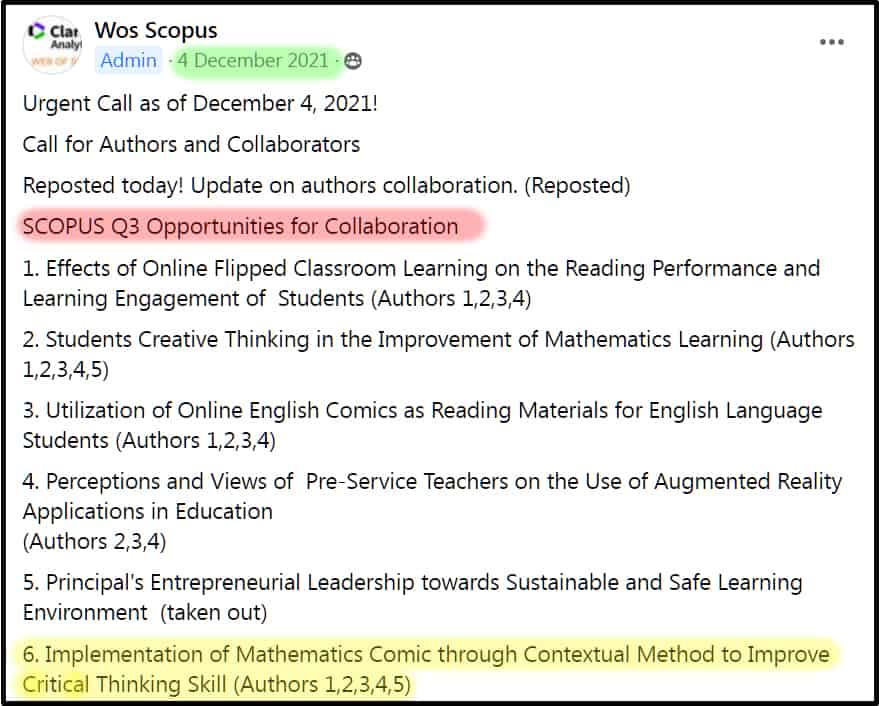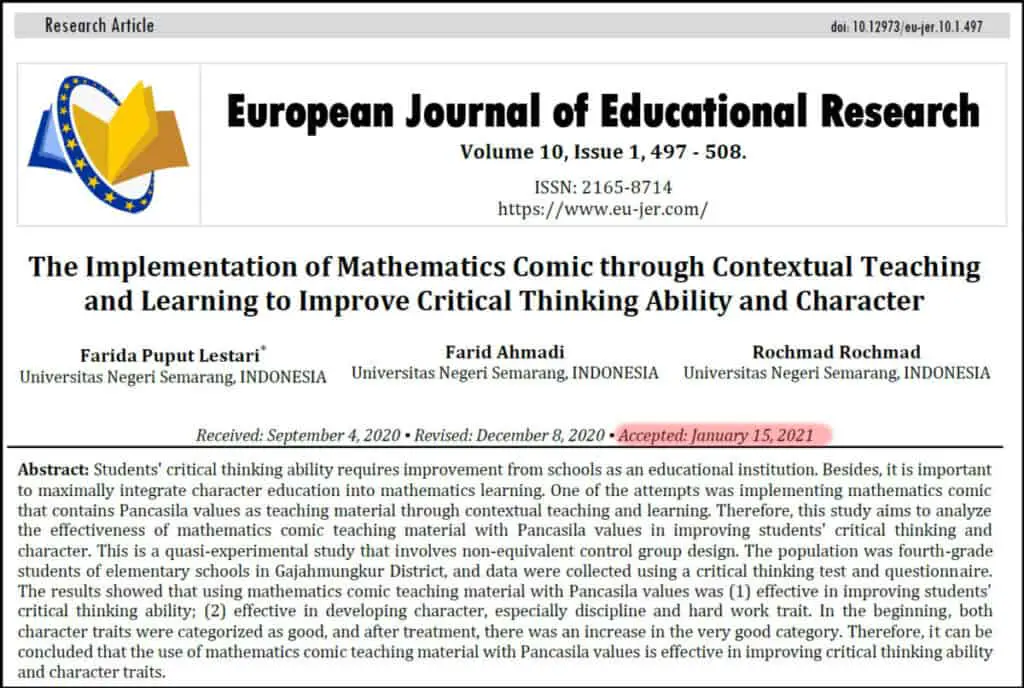In this article we address a question for which we have no answer. We are hoping that you can help us solve it.
We have become aware of a Facebook post seeking co-authors for a paper. Yet, we think, we think the paper was published almost a year earlier. We cannot really work out what is happening.
We seek your help in answering this question.
If you are interested in this aspect of predatory publishing (if we can call it that), we wrote a previous article we addressed a similar issue to that discussed in this article.
The Facebook post
Figure 1 shows a Facebook post (if you click on the link, you may not be able to see the post as you have to be a member of the group to view posts), in the Facebook Group called “Journals Indexed in Scopus/ Thomson Reuters“.
We would draw your attention to three points.
- This post was made on 4 December 2021 (green highlight).
- It is offering opportunities for collaboration in a Scopus Q3 journal (red highlight). From the author “positions” after each journal title it looks as if they are offering (we assume for a fee) the possibility of being an author on that paper.
- The main focus of this article is the sixth article (yellow highlight).
We go into more detail of each of these points below.
The paper we found
Given that the Facebook post was made at the start of December 2021, and we are writing this article in the middle of February 2022, it seemed natural to see if the paper had been published already, and then to see what conclusions, if any, we could draw (for example, how many authors there were, did any of the authors come from those who had expressed an interest to the Facebook post).
We searched for the paper title and found this paper (see Figure 2), which you can access via DOI 10.12973/eu-jer.10.1.497.
The Journal
Before we look at the paper, let’s look at the journal, just for completeness.
The journal is the European Journal of Education Research, which is published by the Eurasian Society of Educational Research, which is based in the USA.
Looking at their archives, the journal has been published since 2012.
It has indexed by Scopus since 2018.
Figure 3 shows the information about this journal, as reported by Scopus (left hand side) and the information from the journal’s home page (right hand side). You’ll see that it has an SJR impact factor of 0.319 and is in Quartile 3.
Our Comments
Given the information we have presented above, we have the following observations, comments and questions.
- The titles of the two papers (Journal: “The Implementation of Mathematics Comic through Contextual Teaching and Learning to Improve Critical Thinking Ability and Character“, Facebook post: “Implementation of Mathematics Comic through Contextual Method to Improve Critical Thinking Skill“) looks too close to be coincidental. At least we think so.
Perhaps we are wrong and the Facebook post is referring to a different paper, in a different journal. Maybe, time will tell but, at the moment, we think that the two papers are the same. - It is telling that the Facebook post refers to a Scopus Q3 journal, which the European Journal of Educational Research is. This provides further support, albeit not definitive, that it is referring to the same journal.
- There are two things that we do not understand. The first is (assuming we are referring to the same paper) is why was the paper published in January 2021 (see Figure 2), yet the call for authors is put out in December 2021 (see Figure 1)? Does anybody have any answer to that question?
- The second thing we do not understand is, how the authors positions are “sold”? The Facebook post mentions that positions 1-5 are available. We are unsure how this works. Does anybody have any insights that they could share with us, particularly how this “scheme” works in the general sense, rather than just this specific example.
- Finally, even if the two papers (Facebook post and the published paper) are unrelated, we still question the legitimacy and the ethics behind the calls for authors that we can see in Figure 1. We would welcome any comments/views you have. Let us know in the comments.
Disclaimers
We need to point out, that we are not making any accusations, insinuations or drawing any negative conclusions about the authors of the paper shown in Figure 2. They published a paper, in a Scopus journal in January 2021 and we do nothing but congratulate them.
Similarly, we are not painting the journal in any negative light. They have published a paper and we have no reason to believe that anything untoward has taken place.
What we do question is the Facebook post (Figure 1). Even if that Facebook post is not related in any way to article shown in Figure 2, there are still questions that need to be answered about this parctise.
Final Remark
If you have any comments on this post, please make your view known in the comments section. We do moderate comments, for (we hope) obvious reasons, so any comments you make may take a little while to appear.





